Appointment
Today
First, if you have broken, missing, sensitive, or unhealthy-looking teeth, we can help. Secondly, Roman Dental makes tooth removal and denture placement comfortable and convenient. Third, because Roman Dental has an onsite dental lab, dentures can be customized and made more quickly. Additionally, dentures from our office are repaired on the same day.
To ensure a great result, communication between the dentist and patient is made simple. Roman Dental has a small team: a gentle dentist, a laboratory technician, and assistants. Therefore, communication is clear. As a result of working with a small group of professionals, it is easy to follow through on each person’s care details. Most importantly, this close communication supports patients through the tooth replacement process.

In a single location, Roman Dental provides five common denture treatments.
As a result, patients do not need to drive to different dental offices and coordinate appointments. Additionally, the office is equipped to perform dental surgery with the benefit of conscious sedation. The whole denture process is done in a single office location while the patient “sleeps.”
Roman Dental has been focused on the replacement of hopeless teeth for over 25 years. Today, many tooth replacement options are available. Because of our experience with all the different methods of tooth replacement, we offer choices. Most importantly, we provide information to help patients choose the best options. Dr. Roman has the education and experience to treat people with health-related conditions who require dental services.

Denture treatment is only recommended when teeth are in such a bad condition that they cannot be saved. However, individual health circumstances, like being prone to cavities and gum disease, or drug addiction and trauma make tooth removal the best solution. For many people, replacement with full dentures, partial dentures, or implant dentures is a practical option. We realize that this process can be anxiety-inducing. Therefore, to create a relaxed setting, we take the time to keep our patients comfortable and well-informed during treatment.

Our mission is to provide dentures that fit, are comfortable, and deliver a naturally attractive smile. Successful in our mission, the self-confidence of a great smile is noticeable to everyone. For each patient and their loved ones, we attempt to provide denture services in a caring way. Dentures, with or without implants, put an end to recurring toothaches and dental problems. As a bonus, for so many people, well-made dentures return the joy of smiling.

Quality denture products play a significant role in the aesthetics, function, and durability of your denture. Like products at the grocery store, dental manufacturers provide a range of denture teeth and base materials of differing quality and pricing. Ask your dentist about available options. Choosing a higher grade of teeth makes the denture more attractive. This is because higher-quality teeth are shaped and colored like natural teeth. Additionally, better denture teeth are harder and, as a result, wear more slowly. Quality denture materials make a subtle but significant difference in aesthetics and durability.
Dentures are made of two parts:
The base material is the pink part of the denture that provides strength. It rests against the gum tissue and holds the denture teeth in position. The teeth have the biggest effect on appearance. Therefore, selecting teeth that are durable, properly sized, shaped, and colored is important.

During your initial consultation, Dr. Roman and our team will walk you through all of your denture options, including unique materials your new prosthetics can be made from, and all of the customized details that will allow our dental laboratory to craft the best-functioning dentures for you.

After teeth are removed, the jaw bone shrinks. Dentures are supported only by the gum tissue, which lies directly under the denture base. After teeth are removed, the jawbone that supports the overlying gum tissue slowly dissolves away because the tooth roots’ function no longer stimulates the bone. Consequently, as a person ages, the dentures get looser, often making speech and chewing difficult. This is particularly troublesome for people wearing a lower denture.
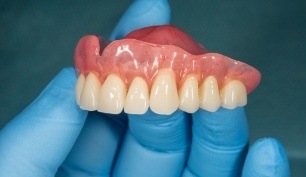
Dental implants are used to support dentures. In other words, when implants are placed within the jaw bone, chewing forces are transmitted directly into the bone rather than the force just pressing against the sensitive gum tissue. Most importantly, this makes chewing more comfortable. Secondly, because chewing forces are delivered into the bone rather than to the gum tissue, bone stimulation occurs. As a result, the jaw bone does not shrink. The jaw will maintain its youthful shape as long as chewing forces activate the bone cells.
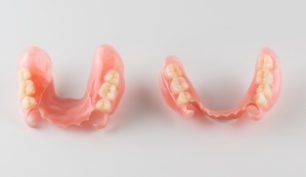
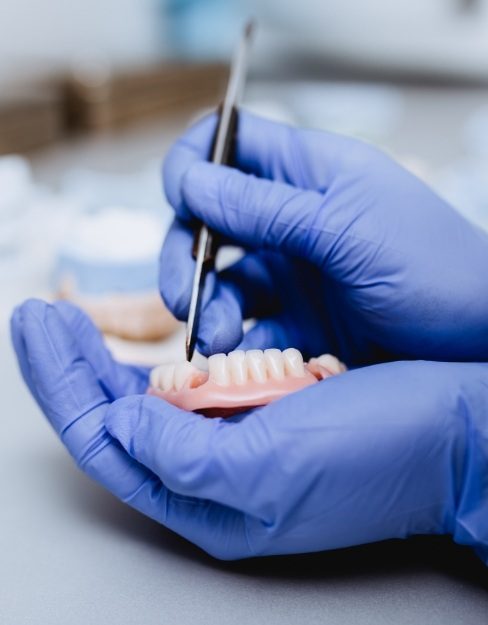
After teeth are lost, whether it’s from trauma, gum disease, or decay, the jaw bone slowly undergoes a degenerative process resulting in the bone shrinking. Over time bone shrinkage (resorption) causes the denture to float and shift around. Remaking or relining the denture’s internal layer will compensate for the bone loss and reduce denture shifting and movement.
Relining requires that an impression of the jaw be made. The impression is used as a pattern to process a new layer of acrylic within an existing denture. Relining improves the fit and may reduce or eliminate the need for denture adhesives. Reline material fills in the gap between the denture base and gum tissue. The snugger fit provides a solid base to help chew and to resist the flexure of the denture. Poor-fitting dentures often flex due to a lack of gum tissue support. This flexure eventually causes the denture to crack.
Denture relines can be made from hard or soft materials. Although relines can be completed in a single office visit, these chairside relines are porous and can develop odors and often peel out of dentures over time. The best option is usually a hard laboratory reline. Laboratory relines produce a tough, non-porous, durable surface, but requires that the denture be surrendered overnight for heat and pressure processing.
Relining is a great service for a loose denture that is otherwise in good condition, with a strong base and un-worn denture teeth.
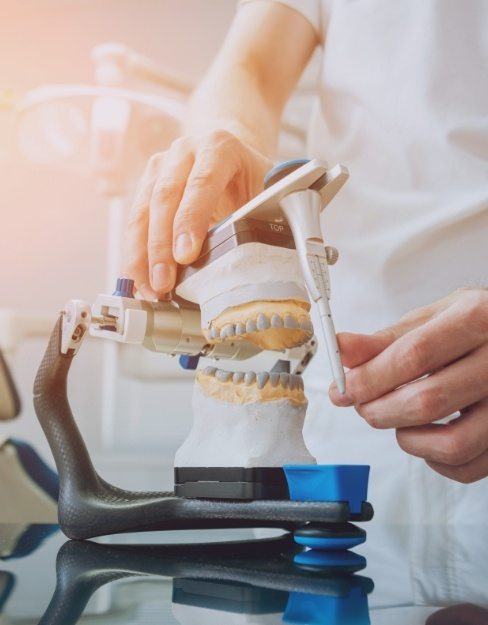
Roman Dental quickly repairs cracked denture bases and replaces missing denture teeth fast. Roman Dental offers same-day repairs. An on-site denture lab makes the repair process fast and simple. We repair All-on-4 dentures, implant-supported bridges, and full and partial dentures. Depending on the condition of the denture, a repair may be temporary or last indefinitely. A temporary repair can last until we can make a new appliance if a denture is old and worn. Cracked dentures and dental plates with missing teeth are usually repaired during the same business day.
Bring your denture to the office early in the morning so that the denture can be ready for pick-up in the afternoon. Denture repairs usually do not require the patient to be seen by the dentist. When dropping off the denture for repair, bring it clean and in a clear plastic bag so that the staff can quickly determine how long it will take to repair your denture.
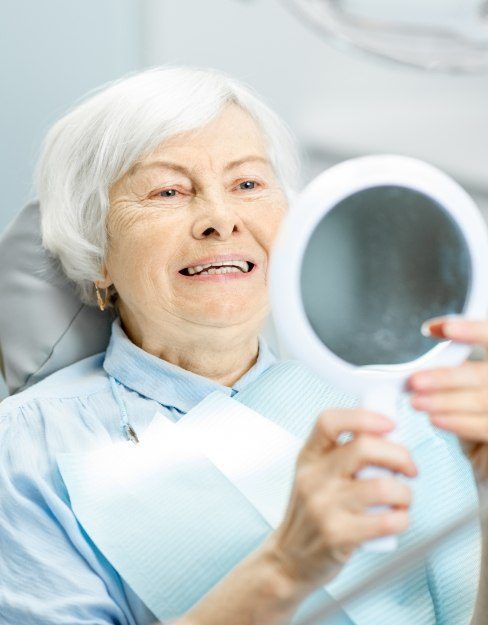
Do you have questions about what your life will be like with dentures, how you should take care of your new prosthetic, or what the procedure is like? Our team is happy to get you all of the information you need to make the best decisions for your smile, which is why we’ve compiled our answers to a list of common questions that we receive from patients below.
Gather any broken parts or teeth that have chipped off of the pink base material. Clean off any denture adhesives and food debris. Rinse the pieces with water or mouth wash. Place all the pieces in a plastic bag or container so that they don’t get lost. Please take all the pieces to the dentist to have them repair or replace the denture. Even if the denture is not repaired, the dentist can use the old denture as a guide when making a new one. Having the old denture allows the dentist to know more quickly about positioning the denture teeth for the best look and function. Avoid using do-it-yourself denture repair kits.
Broken denture repair kits can work temporarily. The DIY kits from drug stores are handy for quickly reattaching a tooth broken off the pink denture base.
Caution: If a denture is broken into pieces and has a clean crack line, a dentist can properly fit the broken pieces together and achieve a strong, lasting result. The repair acrylic in a do-it-yourself kit works by chemically melting and fusing the broken edges. Once the edges are melted, a dentist will no longer properly fit the broken pieces together. If edge melting occurs, a new denture will need to be made.
In a desperate situation, a denture repair kit can help temporarily. However, the kits can ruin the denture. This is especially true if it is being used to fuse broken pieces.
Oftentimes, dentures break due to changes in the size of the jaw bone. After teeth are removed, the jaw bone begins to shrink. The denture will wobble on top of the shrunken jaw. The shrinkage of the jaw creates a lack of support under the denture. The lack of support allows the denture to flex under the stress of chewing. Eventually, this stress causes the denture to break.
Loose dentures can usually be made to fit more tightly. A new layer of acrylic (plastic) is bonded to the existing denture’s internal aspect in a denture relining process, making it more stable. The benefits of relining are most noticeable to patients who have been wearing the same denture for over two years.
Patients who have had a change in body weight since they originally got their dentures see a big improvement in denture fit after a reline. Denture relines can be done quickly during a single appointment or as a lab procedure requiring a second visit. Unfortunately, quick, in-office relines are porous and subject to absorbing odors. Additionally, in-office relines are prone to peeling out or delaminating from the existing denture base.
The alternative denture relining method is accomplished by processing the denture’s new internal surface in a laboratory. The lab processed reline a durable and hygienic result. Lab relining requires that the denture be surrendered to the lab. Overnight, a pressurized processing technique produces a dense acrylic reline, ready to be returned to the patient the following day.
Dentures that are made of high-quality materials can provide excellent aesthetics and function. A quality denture will commonly last five to seven years. Like car tires rated by expected mileage, denture teeth are made with differing wear performance.
Dentures that repeatedly break because of wear or age should be replaced. New replacement dentures can be designed with reinforcement to prevent future cracks, provide lip and cheek support, better fit, comfort, and aesthetics.
All dentures are custom-made to fit the unique shape of a person’s mouth. However, some mouths have better shape and structure, allowing the denture to stay in position and function properly. The most common complaint of denture wearers is the lack of stability of lower dentures. Bottom denture looseness is due to the tongue’s movement and the horseshoe-shaped ridge’s narrowness that supports the denture. Additionally, some patients have very little “ridge height.” In patients with small ridge height, the tissue under the tongue, known as the mouth floor, acts like a trampoline pushing the denture up off the ridge, causing the denture to float.
For some patients, even the best-made dentures don’t work. These patients experience tenderness, denture slippage, gagging, poor aesthetics, frustration, and an inability to chew. Universally, this struggle results from a lack of jawbone to support the denture or intolerance for the denture base, which contacts the mouth’s surfaces. For these people, we must anchor the dentures to the jaws to prevent denture movement. Dental implants lock a denture in place, preventing it from shifting when chewing or moving the tongue while speaking.
When adhesives don’t work, dental implants provide the best solution. By placing two conventional implants with snap-on attachments, the denture locks into position as an alternative; four small diameter dental implants can be placed. These so-called mini implants provide dental anchorage at less than half the cost of conventional implants. Mini implants can be placed without bone grafts or waiting periods. With an implant stabilized denture, a person can laugh, talk, eat and sing with confidence.
Roman Dental on Memorial Drive in West Houston specializes in quickly stopping pain and making people feel relaxed and comfortable. Roman Dental repairs broken front teeth with cosmetic dental bonding, veneers, and ceramic crowns. Even teeth that must be extracted can be replaced with or without dental implants by Dr. Kotlarek and his team of dental technicians. Roman Dental offers same-day appointments to resolve toothaches and problems with sensitivity and discomfort. Additionally, this emergency dental care office provides root canal therapy, night guards for clenching, medicated fillings, and extractions when necessary.